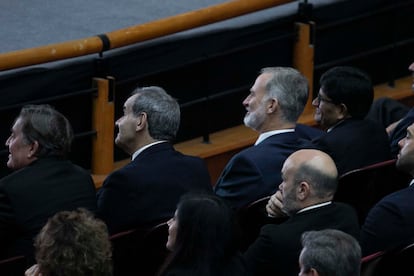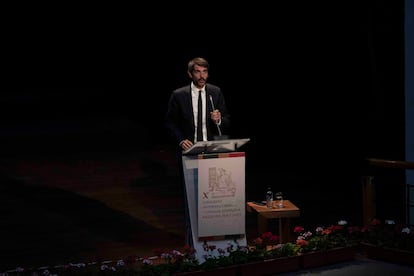“Is it too early to assess the size of Mario Vargas Llosa?” The question flew over the auditorium almost at the end of the tribute ceremony for the Peruvian Nobel Prize winner, held this Wednesday during the International Language Congress of Arequipa (CILE) in Arequipa, his hometown. With the presence in the front row of the King of Spain, Felipe VI; friends, writers and authorities praised the figure of Vargas Llosa, who died this spring; his precocity, his intellectual and political ambition, his adventurous globe-trotting life, his willingness to debate, his public omnipresence. But Javier Cercas’ question went one step further. The Spanish writer asked for time given the impressive career of the honoree. Cercas confessed that he still does not dare to accept the word “friend,” with which the Nobel Prize winner considered him. And he justified his modesty by remembering a generous column that Vargas Llosa wrote in the nineties about one of his first books. “My destiny changed, I was in my early thirties and my family and friends read to me. At that age, he already had at least three masterpieces published. His generosity was something I could never reciprocate. Friend? It was more like the pyramids, it was always there.”
The celebration of the CILE in Arequipa represents another objective achieved for Vargas Llosa, who promoted during his life that the known as the white city, where he barely lived for a year, would host the congress. The Spanish Minister of Culture, Ernest Urtasun, pointed out that Spain owed him a tribute and “doing it here, in his native Arequipa, is unbeatable.” Vargas Llosa lived at different times in Madrid and Barcelona, where he wrote some of his masterpieces. He even had Spanish nationality and was an academic at the Royal Academy of Language (RAE), one of the organizers of the congress. Urtasun stressed that “few writers have managed to achieve that status in their lifetime” and acknowledged having read their works “with passion, surprise and not always affinity, but never with indifference.”
His role as a public intellectual, perhaps the last of his kind, was highly analyzed during the event. His political adventure was reviewed, which even led him to run as a candidate for the presidency of Peru and which ended up defeated at the polls by an agronomist who would later become a dictator, Alberto Fujimori. Before, he had gone through a phase of fascination with Marxism, like almost all writers of his generation, to move from social democracy towards an ultraliberal drift. From Fidel Castro it passed to Margaret Thatcher.
His support for controversial figures, such as Jair Bolsonaro in Brazil or Javier Milei in Argentina, and even his support for Keiko Fujimori, the daughter of his nemesis in the nineties, had him in the permanent eye of the hurricane of public discussion.
“He could have made mistakes like we all make mistakes, but he never made mistakes in his favor, always against them,” said Cercas, who also ventured that “if he had not gotten into all those troubles, instead of winning the Nobel Prize for literature at the age of 70 (in 2010), he would have won it at the age of 50.”
Luis García Montero, director of the Cervantes Institute, another of the organizers of the congress, disagreed with the thesis that his political militancy may have obscured his career. For him, “he never turned his novels into instruments in favor of his ideology.” And he remembered a conversation regarding one of his last essays, The call of the tribe (2018), where he reviews and reflects on the liberal ideas that have marked him. When reading it, García Montero, a left-wing poet, was surprised by the high doses of self-criticism: “I told him that he seemed closer to my ideas than his, and he responded that when he wrote about literature, literature ruled.”

The director of the RAE, Santiago Muñoz Machado, focused his intervention on that vertex, precisely, between politics and literature. He remembered the presentation speech in 1972, after being accepted as a language academic in Peru. He dedicated it to his countryman José María Arguedas and spoke of his stories “as the place where reality and fiction are confused.” He stopped at some reproaches from readers who approached his works too literally, so often constructed from historical episodes. His answer is, according to Muñoz Machado, in another of his essays, The truth of lies (1990), where he argues that only by lying can literature express a truth that can only be said covertly. And he closed by quoting another of his writings, his essay on the work of García Márquez, to apply to Vargas Llosa himself something he said about his colleague: “The writer is a dissident. Writing novels is an act of rebellion against reality.”

